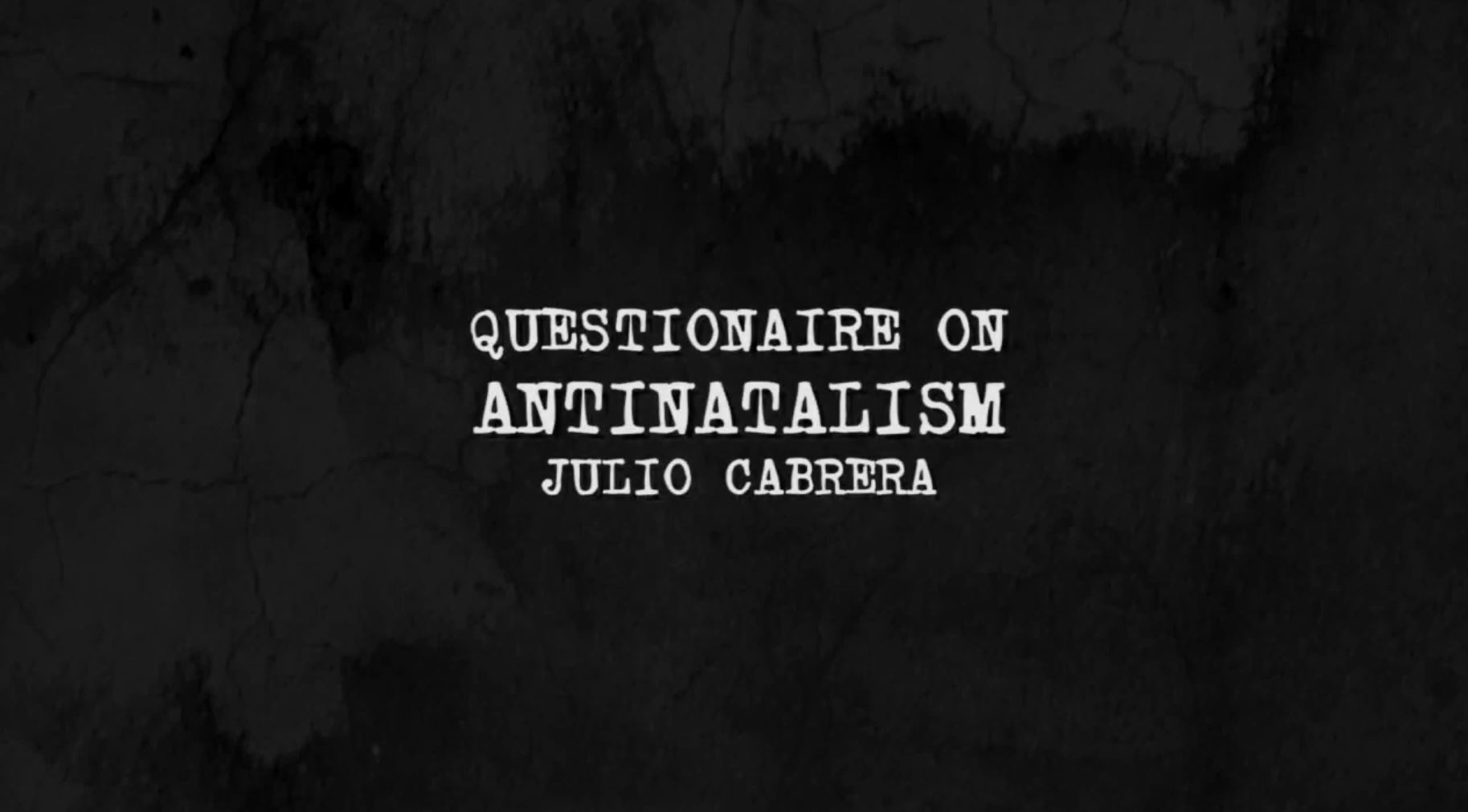
The following text is the third and last part of my comments on some of Julio Cabrera’s replies to the questions he was asked in The Exploring Antinatalism Podcast #19 – Julio Cabrera ‘Questionaire on Antinatalism’. In this part I’ll address Cabrera’s reply to the question of involuntary sterilization.
For comments on his replies to questions regarding his general approach to Antinatalism please read part 1. And for comments on his replies to the questions regarding: The moral status of animals, Abortion, EFILism, and Veganism, please read part 2.
Question 16:
“If it were so that the only way to stop people from procreation was something akin to involuntary sterilization, you say that the end justifies the means? Do we have a moral obligation to prevent others from committing the ultimate moral transgression – procreation? If yes, then how? If no then why not?”
Cabrera:
“Involuntary sterilization would be something totally immoral within a negative ethics, in a certain line of argumentation, of course. I have one theoretical line and another practical.
(1). At least within a deontological and not utilitarian ethics such as negative ethics, in order to decide something ethically we have to take into account the autonomies of those involved. In this case we have two autonomies to consider: the real autonomy of the procreators and the conjectured autonomy of the procreated.”
First of all, it is hard to ignore that when Cabrera wants to counter-argue involuntary sterilization then there is a division between the real autonomy of the procreators and the conjectured autonomy of the procreated, but when he wants to counter-argue abortion, then not only the autonomy of the procreated, but the autonomy of the fetus is not conjectured but considered as real and equal to its parents’ autonomy, despite that it is not even conscious yet. If you are baffled by this claim, please listen to his stand regarding abortion in the questionnaire (question 21), or read about it in the second part where I am addressing his anti-abortion view.
But obviously the point is to try and deal with the core of the argument, so I’ll ignore the manipulation and focus on the point he is making here which is that we must consider the autonomy of the people who have a desire to procreate.
The reason this argument is false is first of all since a desire is not an ethical justification. The desire to do something is insufficient as a moral justification to do it even if the desirers are autonomies. Obviously people have an interest to procreate, that’s why they are procreating, but that is a description of our dire reality, not an ethical justification of it.
It is ethically false, if not absurd, to consider the interests in doing something which is basically wrong, as a counter argument for the action’s wrongness. It is balancing the harmfulness of a crime with the interests of the criminals to perform it.
A strong interest to do something wrong doesn’t make it right. Neither does the resulted frustration if the wrong action is prohibited. To claim otherwise is to nullify criminalness, as all that any offender should claim is that by stopping him from committing a crime we are violating his autonomy. The autonomy of every offender would be hurt if they couldn’t continue with their offences, is it a justified reason to let them go on with their crimes? Rapists might feel that their autonomy is hurt if they are not allowed to rape, or if they are caught, is that a reason not to do everything we can to stop them? Can the desire to rape be an argument in favor of raping?
Can people’s autonomy and desire to eat animals be a justification for the torture of the animals they consume? Arguing that all factory farms must be closed down today for the pain and misery they cause can’t be seriously counter argued by claiming that people have a desire to eat meat, eggs and milk, and preventing it from them is not considering their autonomy.
Cabrera argues that:
“Even though it is immoral to procreate from the antinatalist perspective that we assume, there are other perspectives that present reasonable counter-arguments (in fact, Benatar is frequently answering objections because the question is highly controversial).”
Of course this question is highly controversial but not because there are other perspectives that present reasonable counter-arguments, or because it is highly complicated in philosophical terms, but because people want to procreate. It is arguments against selfish desires, social conventions, biological urges, and many other motivations, but definitely not reasonable counter-arguments.
There are no perspectives that present reasonable counter-arguments to antinatalism, there are only excuses that present counter-motivations to antinatalism.
The desire of people to procreate is morally wrong and therefore their autonomy can’t be weighed, not to mention in an equal manner, against the harms forced on the procreated.
Cabrera is aware that the only way to justify the refusal to impose on procreators the prevention of their immoral desire to procreate is by arguing that it is not necessarily immoral. Since if it is immoral, then it is morally justified to ignore the autonomy of the criminals and impose a prevention of their crimes just as it is in other cases of immoral actions such as torture, rape and murder. Therefore he makes the following move:
“If we have the right not to respect the autonomy of the murderer when he is about to kill someone, why would we not have the right to not respect the autonomy of the procreator when he is about to generate someone? I reply that in the case of existing people, we can clearly see that the victim of a murderer wants to continue to exist (and if he does not want to – as in the case of assisted suicide – we can also know this). But in the case of non-existent people, antinatalists assume uncritically that the non-being wants certainly to continue not to exist.”
By claiming that in the case of procreation, as opposed to murder, there is room for speculation, Cabrera states that he is not really sure about his claims regarding the immorality of procreation.
It might be the case that he thinks that procreation is not a serious crime as murder, but that would go against many of his other claims, including ones he has made along the questionnaire, and definitely ones that he made in the book A Critique of Affirmative Morality. For someone whose antinatalism is so heavily based on the harm of mortality, I would expect him to argue that not only is procreation a crime as serious as murder but actually is a type of murder. And since when he talks about mortality he is not only arguing that it is a harm because everyone must die, but because everyone starts dying when they are born, procreation is supposed to be consider by him even worse than murder as it is a slow structural murder. It would have made sense for him to claim that since people are in a constant state of dying then procreators are in a constant state of murdering. But instead of making claims which are accordant and consistent with his other claims, he insists on abruptly claiming that antinatalism is speculative.
For anyone who is less familiar with Cabrera’s other stands, here is a representative sample taken from his book A Critique of Affirmative Morality:
“Even we do not know, for example, whether they will enjoy traveling, working or studying classical languages, we do know they will be indigent, decadent, vacating beings who will start dying since birth, who will face and be characterized by systematic dysfunctions, who will have to constitute their own beings as beings-against-the-others – in the sense of dealing with aggressiveness and having to discharge it over others – who will lose those they love and be lost by those who love them, and time will take everything they manage to build, etc.” (p.54)
And one taken from his article Negative Ethics:
“To come into being is to be ontologically impoverished, sensibly affected and ethically blocked: to be alive is a fight against everything and everybody, trying all the time to escape from suffering, failure and injustice. This strongly suggests that the true reason for making someone to come into being is never for the person’s own sake, but always for the interest of his/her progenitors, in a clear attitude of manipulation; radical manipulation indeed because, in contrast with usual manipulation of people already alive, manipulation in procreation affects the very being of the person, and not only some of his/her predicates.”
So Cabrera’s own antinatalist claims aren’t in line with his reply. Neverthelss a serious reply must be made to the argument that “antinatalists assume uncritically that the non-being wants certainly to continue not to exist”, an argument he further develops along his answer accusing antinatalists for easily going from the premise that the world is a bad place, to the conclusion that nobody wants to live in a bad place. And he finds this sequitur controversial:
“If our conjecture about the interests of the non-being is totally rational, it is certain that it would prefer to continue in the same state. But if the conjecture is made on the basis of humans we know, emotions will prevail over reason and the interests of the non-being could be, despite everything, to come into existence. After all, we are recreating the autonomy of the procreated in pure speculative terms, guided by certain philosophical ideas; but there are perspectives guided by other ideas according to which the non-being wants to exist and is asking for it. This, of course, is equality speculative. But how can one unite between two equally conjectural conceptions of the interests of the not being? Pure speculation about the desires of the not being, in the impossibility of deciding between speculations, is strong enough for me not to procreate, but it seems too weak to prevent others from procreating. What is a strong reason for making my own decision may not be strong enough to justify intervention.”
I will ignore, for the sake of the argument, that he seems to ascribe interests to non-beings, and even that like many pro-natalists, he of all people, the philosopher who criticized Benatar’s asymmetry and presented a different and quite unique approach to antinatalism, treats antinatalism as if it is a movement with one argument, let alone one that is ascribing interests to non-existing beings, despite that there are many other reasons why procreation is wrong, and I’ll focus on the speculation issue.
In order to oppose involuntary sterilization Cabrera takes the very long road of arguing first that the parents’ autonomy and desire must be considered despite that procreation is morally wrong (a claim which is addressed above), and that although he thinks that procreation is morally wrong, antinatalism is speculative. The fact that procreation is morally wrong is not speculative because it needs not to be based on conjectural conceptions of the interests of non-existing beings, but on the fact that at least the interests of some created people would be never to have been.
Given that lives which are found not worth living by the ones who are living them, not by antinatalist, are being created all the time, there is nothing speculative about the claim that the interests of at least some created people is that they had never been created. The fact that their creation severely harms them is not speculative but unquestionable. So letting procreation continue despite that it is guaranteed that at least some of the created people would rather never to have been, is actually claiming that forcing some people to endure miserable lives that they wish were never imposed on them, is justified by the desire of other people to procreate.
This argument must not be confused with the common antinatalist risk argument. Although I find it one of the strongest antinatalist arguments, I think there is something misleading in its common formulation. That is since on the global level procreation is not a gamble, it is not a risk, it is absolutely certain that some persons would be forced to live extremely miserable lives. Somewhere in the world, miserable persons are being created. And that fact turns the argument from a risk that some of the created people would be forced to endure horrible lives, to a decision that some of the created people would be forced to endure horrible lives. People who decide to procreate are not only taking a risk on someone else’s life, they also approve and strengthen the claim that the suffering of some is justified because of the desire of others to procreate. The procreators’ autonomy argument entails sacrificing people who would be miserable if procreation is allowed, for the sake of people’s autonomy if procreation isn’t allowed.
So the speculative argument is false, as even if I’ll accept for the sake of the argument that it is speculative whether everyone’s existence is a harm, it is not speculative that if procreation is allowed, miserable lives would inevitably occur.
One might suggest that what we ought to do is weigh the interests of the people who want to procreate against the suffering of the ones who would have miserable lives, but that is a false equivalency. That is since procreation is not only forcing needless and pointless suffering on the created person, but is in fact, first and foremost, forcing needless and pointless suffering on thousands of other sentient creatures, since each person created is hurting thousands of sentient creatures during a lifetime.
Even if we’ll accept for the sake of the argument that it is speculative whether the created person is going to be harmed as a result of its existence, there is nothing speculative about that thousands of sentient creatures would be harmed by the created person.
It is very hard to accurately assess the harms caused by each person since it depends on various factors such as location, socioeconomic status, consumption habits, life expectancy, livelihood, diet and etc., however, regardless of any circumstances, harming numerous others is inevitable.
And the most immediate and prominent harm is caused by what people eat.
Every person has to eat, and every food has a price. Unfortunately, most people are choosing the ones with the highest price – animal based foods.
Each person directly consumes thousands of animals. More accurate average figures are varied according to each person location. An average American meat eater for example consumes more than 2,020 chickens, about 1,700 fish, more than 70 turkeys, more than 30 pigs and sheep, about 11 cows, and tens of thousands of aquatic animals, some directly and some indirectly (as many of which are fed to consumed animals).
Therefore in most cases procreating is choosing that more fish would suffocate to death by being violently sucked out of water, that more chickens would be crammed into tiny cages with each forced to live in a space the size of an A4 paper, that more calves would be separated from their mothers, and more cow mothers would be left traumatized by the abduction of their babies, it is choosing more pigs who suffer from chronic pain, more lame sheep, more beaten goats, more turkeys who can barely stand as a result of their unproportionate bodies, more ducks who are forced to live out of water and in filthy crowded sheds, more rabbits imprisoned in an iron cage the size of their bodies, more geese being aggressively plucked, more male chicks being gassed, crushed or suffocated since they are unexploitable for eggs nor for meat, more snakes being skinned alive, and more crocodiles and alligators being hammered to death and often also skinned alive to be worn, and more mice, cats, dogs, fish, rabbits, and monkeys being experimented on.
Since most humans, more than 95% of them actually, are not even vegans – the most basic and primal ethical decision one must make – procreation is practically letting a mass murderer on the loose.
And it is not that vegan food is harmless. It is much less harmful, but still very harmful. It is impossible to eat without harming someone, somewhere along the way, even when sticking to a vegan, local, organic and seasonable diet. It is impossible to entirely avoid using fertilizers, packages, pesticides, transportation, water, energy, and to avoid producing waste.
For a broader explanation why harming is inevitable please read the text the harms to others, where there is a more detailed information regarding some of the inherent harms of humans, all humans, and regardless of what they eat.
And anyway, a vegan, local, organic and seasonable diet, is relevant for extremely tiny minority of people who care enough to choose the least harmful options at any given time. Even most vegans and environmentalists are not doing that. Most vegans simply consume plant based food, and most environmentalists still hardly connect food with environmentalism. In recent years there is a positive awaking in that area, but still it mostly regards dolphin safe tuna, food’s carbon footprint, bottled water, and avoiding six pack rings.
And of course the vast majority of people are extremely far from even being aware of all of that, not to mention considering it, or even thinking that they should. And that is a very strong reason for forced sterilization, since there is no way to avoid harming others even if everyone tried, and currently the vast majority of people not only don’t want to, but support the exact opposite.
Living on a planet with limited resources, no one can really avoid getting in conflict with others. No one should cause suffering to anyone, but no one can not cause suffering to others. Everything people do affects others, so it is even theoretically impossible to fulfil the most basic ethical requirement – do no harm. And practically, it is far from being the case that people are harming only since and when they cannot do otherwise. I wish people were harming others only for survival reasons. Reality is unfortunately much crueler. People harm, exploit, torture, humiliate, deprive, attack, ignore, abuse and whatnot, for much less essential reasons. People don’t harm others because they have things that they need, but mostly because they have things that they want.
It is interesting that Cabrera has made a rhetorical comparison between procreating and killing, since the two shouldn’t only be compared on the rhetorical level. As aforementioned, in some sense, especially under Cabrera’s notions of procreation and death, procreating is killing as it is creating someone who has to die. And while that maybe speculative and arguable, the fact that every person kills many others during its life is inarguable. People are killing others on a daily basis, mostly to feed themselves but also to cover themselves, to move from place to place, to heat their houses, to build their houses, and practically for most of the things they consume. So even if you disagree with the claim that procreation is murder because it is creating someone who would necessarily die, procreation is murder anyway because it is creating a mass murderer.
Procreation and murder are in fact intertwined. Since as Cabrera mentioned earlier, we have the right not to respect the autonomy of the murderer when he is about to kill someone, we have the right not to respect the autonomy of the procreator when he is about to generate someone, as that someone would necessarily be a murderer.
Cabrera argued that there are two different autonomies which must be considered, of the procreators and of the procreated, but he ‘forgot’ the thousands autonomies that are violated by each created person. Before discussing the autonomy of procreators and procreated, we must consider the autonomy of everyone who would be harmed by each procreation.
Even if we could know the interests of non-existing persons before creating them, we first must consider the interests of everyone who would be sacrificed and otherwise harmed by these persons. We must consider their interests not to be genetically modified so they would provide the maximum meat possible for the to-be born persons. We must consider their interests not to be imprisoned for their entire lives. We must consider their interests not to live without their family for their entire lives. We must consider their interests not to suffer chronic pain and maladies. We must consider their interests not to be deprived of breathing clean air, walking on grass, bathing in water, and eating their natural food. We must consider their interests not to be violently murdered so the to-be born could consume their bodies. We must consider their interests that their habitats won’t be destroyed, and that their land, water, and air won’t be polluted.
Procreation is not only creating a subject of harms and pleasures, but a small unit of exploitation and pollution. Therefore, the question is not is it justified that people would impose harms on another person so they can fulfil their desire to procreate, but is it justified that people would impose immense harm on many others so that they would fulfil their desire to procreate.
The question in point is not is it ethical to take the risk of creating miserable lives, but is it ethical to impose immense suffering on many others so that a truly tiny minority would
experience parenthood. How can it possibly be acceptable to force lives full of suffering on thousands of sentient beings, just so that one unethical preference of would-be parents won’t be frustrated?
But it goes even further than that. What should be weighed against the interests of people who want to procreate is not only the people who would be born into miserable lives, and not only the nonhuman animals who would be harmed by the newborns of the current people who want to procreate, but all the harms, and all the misery, and all the suffering that would ever be caused by humans. The equation is between one generation of people who would sacrifice their desire to procreate, and all the victims of all the procreations that would ever occur.
Human procreation is not only risking “a tiny minority” who might be sacrificed for the sake of people’s desire to procreate, it is ensuring that numerous generations of sentient creatures would be sacrificed for one desire of an extremely tiny minority – one generation, of one species only.
And since people don’t even take seriously the possibility that their own children might suffer extremely, there is no chance they would ever take seriously the certainty that numerous generations of sentient creatures would suffer extremely because of their procreation. That’s why we mustn’t wait until people understand that it is ethically impossible to justify procreation, but do everything we can to make it impossible to procreate, or in other words involuntary sterilization.
However Cabrera argues that:
“Within a negative ethics, the autonomy of procreators, their desire to procreate cannot be ethically justified, as procreation is immoral. But even so, we cannot prevent others from procreating, since at least in an intellectual democracy, people have the right to disagree with the antinatalist theses.”
What Cabrera is saying is that despite that people’s desire to procreate cannot be ethically justified as procreation is immoral, and despite that preventing others from procreating would prevent tremendous misery and imposition from every human that would ever exist, and from every nonhuman that every human that would ever exist would force to endure, since in an intellectual democracy, people have the right to disagree with the antinatalist theses, we cannot prevent others from procreating. That is simply cruel. How can the deprivation of one desire, of one generation only, be seriously compared with the continuance and systematical deprivation of whomever would exist if that one generation is not involuntary sterilized?
Sentient creatures who would exist in the future are not less morally important than sentient creatures who live right now. And sentient creatures who would live in the future infinitely outnumber the ones who are alive today, let alone merely the humans who want to procreate. So giving the current humans who want to procreate the same moral weight as all the creatures that would ever be forced to suffer is a serious case of myopia, speciesism and cruelty.
Cabrera confuses a right to disagree with a right to impose. People may have the right to disagree with the antinatalist theses when it comes to their lives, but they have no right to impose their stands on others, let alone trillions of others. People don’t have a right to impose. And that’s exactly what they are doing when they are procreating. So does involuntary sterilization of course, but that is in order to stop the infinite impositions bound with the infinite procreations that would occur otherwise, it is an imposition to stop the suffering bound with existence. And it is an imposition to prevent one desire, which is totally immoral, and of one generation only, so that all future impositions of who knows how many generations would stop for good.
Imposition is anyway bound to happen. It is either that people would continue to decide for other people that they would exist, generation after generation after generation, and for other creatures that they would have to be exploited, suffer and be sacrificed for the sake of the people they insist on creating, or that we decide for one generation only that they won’t procreate. There is no way around it, decisions are anyway being made for others, the question is will it be only the decision not to procreate and for one generation only, or the decision to feel pain, to fear, to be bored, to be disappointed, to be sad, to be lonely, to be purposeless, to die, to fear dying and many other sources of suffering, and for generation after generation after generation after generation…
Given that the only way to cease the inherent imposition of procreation is with the inherent imposition of forced sterilization, clearly for the long run that resolution holds much less imposition than letting procreation continue on its current horrendous course. The number of individuals who would have to endure imposition of all kinds in the future if it won’t happen, is practically infinite. In fact, even without considering everyone who would ever exist, the number of individuals who endure coercion of all kinds in the present, already defeats the number of people who need to be sterilized.
Objecting involuntary sterilization on the current generation is forcing endless suffering on an endless number of individuals. Imposition is unavoidable, the question is of extent. The imposition involved in involuntary sterilization is for one generation only. The imposition involved in the refusal for involuntary sterilization can last until the sun burns out.
Think about it this way, if one generation of humans had decided that it is wrong to procreate and therefore agreed to sacrifice its desire to do so, that decision would have prevented all the suffering caused by humans from the moment the last person of that generation died. If for example that generation lived in the beginning of 19th century, that decision would have prevented all the suffering that occurred during the 20th century. Two world wars, hundreds of other wars, all the war crimes, all the reeducation camps, the famine in China, the famine in Ukraine, the famine in Japan, the famine in Russia, the famine in India, the famine in Somalia, the famine in Ethiopia, the famine in Mozambique, the famine in Yemen, the famine in Sudan, all the rapes, all the murders, all the tortures, all the concentration camps in Poland, Germany, Cambodia and North Korea, all the diseases, the Holocaust, the ethnic cleansing in Rwanda, the ethnic cleansing in Armenia, the ethnic cleansing in Yugoslavia, the ethnic cleansing in Cambodia, all the animal experimentations, all the fishing, all the hunting, all the beating, all the humiliations, all the accidents, all the disappointments, all the frustrations, all the pains, and every second in every factory farm. Can the frustration of one generation, of one species only, seriously be compared with all these atrocities? Of course not. But the human race is far from being moral enough to decide not to procreate, no matter how obvious, essential, unequivocal and urgent it is. The human race is not moral enough to realize that if one of the former generations had made that call then all the atrocities of the 20th century and the ones happening now in 21st century wouldn’t have happened, and that if they would make that call now, all the atrocities of the 22nd century won’t happen. But the human race would never make that call.
Now if it was possible to sterilize that generation in the beginning of 19th century, an action which would have prevented the horrors of the 20th century, for the price of the frustration of the people who existed in the beginning of 19th century only and wanted to procreate, is it even conceivable to consider if it was worth it? Is it even conceivable to consider if it is worth doing now?
Cabrera argues that:
“We would have to come up with a very powerful justification for intervening in the lives all of these people, to prevent them from doing something that we consider to be immoral, but which they consider to be moral or morally neutral. I am not saying that we cannot intervene; I say that in order to prevent others from procreating, we should have a reason much stronger than the reason that leads us to not have children ourselves. Intervention is a very strong action that must be very well justified.”
And I agree. Indeed intervention is a very strong action that must be very well justified, and it is very well justified by the fact that procreation is a very serious crime.
Procreation is a very serious crime because it is forcing on someone else the most important decision in that person’s life.
Procreation is a very serious crime because it is harming someone else without that person’s consent.
Procreation is a very serious crime because it is gambling with someone else’s life.
Procreation is a very serious crime because it is forcing someone into a needless, pointless, absurd, constant chase after meaning in a meaningless, needless, pointless, and absurd world.
Procreation is a very serious crime because it is forcing someone into a needless, pointless, absurd, constant chase after pleasures despite that pleasures are not really intrinsically good but addictive falsehood smoke screen illusions, which trap sentient beings in an endless, pointless and vain seek for more of them. Pleasures are preceded by wants which are the absence of objects desired by subjects. People want because they are missing something. They seek pleasures to release the tension of craving. Craving or wants, are at least bad experiences if not a sort of pain. Pleasures are short and temporary, and compel a preceding deprivation, a want or a need, which is not always being fulfilled, rarely to the desired measure, and almost never exactly when wanted. And even when desires are fulfilled, the cycle starts again.
Procreation is a very serious crime because it is forcing someone into a needless, pointless, absurd, constant chase after happiness despite that according to the “set point” theory of happiness, which many psychologists find convincing nowadays, mood is homeostatic and we all have a fixed average level of happiness. That means that even desirable things which people do manage to obtain, are satisfying at first, but eventually people adapt to them and return to their “set points”. Therefore people usually end up more or less on the same level of wellbeing they were before. That’s why some argue that people actually run on hedonic treadmills.
Procreation is a very serious crime because there is a very realistic probability that a person forced into existence would be miserable. There is not even a theoretical possibility that a person forced into existence won’t be harmed at all. Creating someone who would definitely be harmed and the only variable is to what extent (with the potential of extreme misery), must be morally prohibited. Given that the motives are never the interests of the to-be born person, it is not only morally flawed, it is selfish, egocentric, arrogant, and careless.
Procreation is a very serious crime because the ample evidences that bad experiences are more important than good ones, not only serve as a proof that good experiences are at least not as good as bad experiences are bad (if not proving that bad experiences almost always outweigh the good ones), but how horrible life actually and inherently is. Basically, pain and other negative experiences, increase the fitness of individuals by enhancing their respondence ability to threats to their survival and reproduction. It has a crucial adaptive function. Existing sentient beings are tortured by evolutionary mechanisms which their only point is that additional sentient beings would exist, regardless of any of those beings’ personal wellbeing. It is a pointless, frustrating and painful trap.
Procreation is a very serious crime because it diverts energy, time and resources from persons who already exist and are in need, to those who needed nothing, were deprived of nothing, and harmed by nothing before they were forced into existence.
Procreation is a very serious crime because life is a constant Sisyphean struggle just to survive a life no one chose. Everyone is bound to overcome needless frustrations, disappointments, pains and discomforts.
Procreation is a very serious crime because each bad moment happening in life is unnecessary. Every pain, every sickness, every fear, every frustration, every regret, every broken-heartedness, every moment of boredom and etc. are all needless. They exist only because the person experiencing them exists. They exist because the parents of that person have forced existence on that person.
Procreation is a very serious crime because lives not worth living is not a theoretical possibility, it is a certainty. People whose lives are not worth living would be born, and the chances for that happening are renewed with each procreation. Misery has no quota. The only way to avoid this worse off option is by not procreating.
Procreation is a very serious crime because there is no way to retroactively revoke it, and there is not even an easy and harmless option for someone to end its own existence. Many people are trapped in horrible lives without a truly viable option to end it because they are too afraid to kill themselves, or because they don’t want to hurt the ones who care about them if they do, or are too afraid that if they won’t succeed in killing themselves they would be socially stigmatized in the better case, or coercively hospitalized in a worse one, or harm themselves so severely while trying to kill themselves that they would end up even worse than they were. Trapping people in the impossible situation of not wanting to live but not wanting to kill themselves so not to hurt others or because they are afraid to kill themselves for any of the mentioned reasons, is a very serious crime.
Procreation is a very serious crime because it forces someone to die, and to fear of death for most of one’s life.
Procreation is a very serious crime because it forces someone into an unfair world where the most crucial factor in having a relatively tolerable life is luck. In a split of a second, even relatively happy lives can turn utterly miserable, often by one wrong decision, or even regardless of one’s actions. One can be very responsible, reasonable and diligent, yet utterly miserable as a result of a mistake made by someone irresponsible, unreasonable and lazy. Life is not only pointless but also unfair, arbitrary and fickle.
And finally, more than anything, what makes procreation such a serious crime, is that it is forcing enormous needless and pointless suffering on thousands of vulnerable individuals. While the person created is one morally relevant creature which would be harmed by being created, each person created is hurting thousands of more morally relevant creatures during a lifetime.
Procreation is so harmful, so wrong, so immoral, and such a serious crime, that it is not enough to oppose it theoretically, we must stop it practically.
Humans’ carelessness, even for their own children, and their cruelty in general, are of the strongest reasons why trying to convince people not to procreate is useless, and why we must find ways to stop humans from procreating regardless of their opinion about it. Just as they disregard the opinion of their children, and all of their children’s victims. That is not to teach them a lesson of course, but because it is the only way to stop this never-ending crime.
The billions of sentient creatures who are imprisoned for their entire lives, the billions of sentient creatures who are being genetically modified so they would provide the maximum meat possible for the to-be born persons, the billions of sentient creatures who are being forced to live without their family for their entire lives, the billions of sentient creatures who suffer from chronic pain and maladies, the billions of sentient creatures that can never breathe clean air, walk on grass, bath in water, and eat their natural food, the billions of sentient creatures being violently murdered so the to-be born could consume their bodies, the billions of sentient creatures whose habitats are being destroyed and polluted, the billions of sentient creatures being skinned alive, castrated, burned, poisoned, kicked, dehorned, mounted, chained, experimented on, enslaved, are all a very powerful justification for intervening in humans’ ability to procreate.
We mustn’t count on human morality. It is speciesist and immoral to allow people to decide and to wait until each one of them would understand and act accordingly, while the victims pile up. We must make a decision for the victims’ sake even without the permission of the victimizers.
Procreation is a crime so serious that it shouldn’t be left for humanity to decide upon. It must be stopped and by involuntary means if necessary. And unfortunately it is necessary.
The problems humans are causing are only getting bigger and bigger, and so the solution must be radical and thorough. People are not going to stop procreating out of their own good will.
Preventing suffering from innumerable generations is a moral imperative. Arguing that something is better, surly in this unequivocal case, ethically compels an intervention to make it happen. After all, to stand idle while generation after generation spawns an unimaginable amount of suffering, is complicity. It is very cruel to let the madness continue without doing anything about it.
People will never stop breeding until we make them. We must stop looking for the best antinatalist argument, and start looking for the best way to somehow sterilize them all.
Cabrera’s practical argument against involuntary sterilization goes as follow:
“If this highly theoretical line of argumentation does not satisfy, there is another more pragmatic: in order to implement a systematic policy of non-procreation with powers to practice involuntary sterilization, we will need an enormous centralized power that compels people not to procreate. In the domain of real politics, a totally unconscious sterilization resource is unthinkable; many people would realize that, in this New Antinatalist Order, they are forbidden to reproduce and that could generate a genuine state of antinatalist terror. Here everything happens as with socialism: it is a good cause – based on equality and solidarity – that may have to resort to some type of violence to be implemented.
The instinctive force to procreate is so high that no weak police could contain it. For this, thousands of other immoral actions would have to be committed just to prevent the immorality of procreation. Even if the procedures were soft, they are intrusive and violent, in one way or another.”
Unfortunately I agree that the instinctive force to procreate is so high that no weak police could contain it. And unfortunately it is also so high that no strong ethical argument could ever contain it. That’s exactly why involuntary sterilization is so needed. Because there is no other way that procreation would ever stop.
I also agree that “in order to implement a systematic policy of non-procreation with powers to practice involuntary sterilization, we will need an enormous centralized power that compels people not to procreate”, and that’s exactly why it is the last thing I imagine when I advocate for involuntary sterilization. My vision is of a chemical or biological agent that compels people not to procreate, not a political one.
Hopefully the method for involuntary sterilization would be the least intrusive and least violent as possible, however nothing is more intrusive and violent than procreation. So even if “thousands of immoral actions would have to be committed just to prevent the immorality of procreation”, they are nothing compared with the trillions of immoral actions that would continue to be committed if involuntary sterilization isn’t committed.
The human race is with no proportion the greatest wrongdoer in history. And things are not getting better. And even if they were, they are currently so horrible that the harm of involuntary sterilization is marginal compared with the harms to existing nonhumans, which quantitatively speaking already by far exceed the number of existing humans, not to mention when considering the harms to every nonhuman who would ever be born. There are more nonhuman animals in factory farms at any given moment than there are humans on this planet. For their sake alone involuntary sterilization is utterly justified. The harm to existing people by preventing them from procreating, can’t seriously be compared to the harms to generations upon generations of sentient creatures whose suffering would be prevented in the case of involuntary sterilization.
The answer to the question do we have a moral obligation to prevent others from procreation, depends on who we ask. If we keep asking humans only, then the answer of most would be that we have a moral obligation not to prevent others from procreating, and only a tiny minority would argue differently. But if we ask anyone who would be affected by involuntary sterilization, anyone whom this question is relevant for but is never asked, an absolute majority would unhesitatingly say that there is a moral obligation to prevent humans from procreating by all means necessary.
Cabrera askes:
“What would an antinatalist say if a natalist society – like ours today – decided to apply fertilizing substances to everyone without their consent?”
Probably that inflicting suffering, let alone without consent, is morally wrong, and that preventing the infliction of suffering, even without consent, is morally right.
That question holds a major false equivalence, since forcing people to create suffering is not the same as forcing people to stop creating suffering. And forcing all people to create more and more people, who would cause more and more suffering, to more and more sentient creatures, is not equivalent to forcing much less people not to procreate, so trillions of victims would be spared.


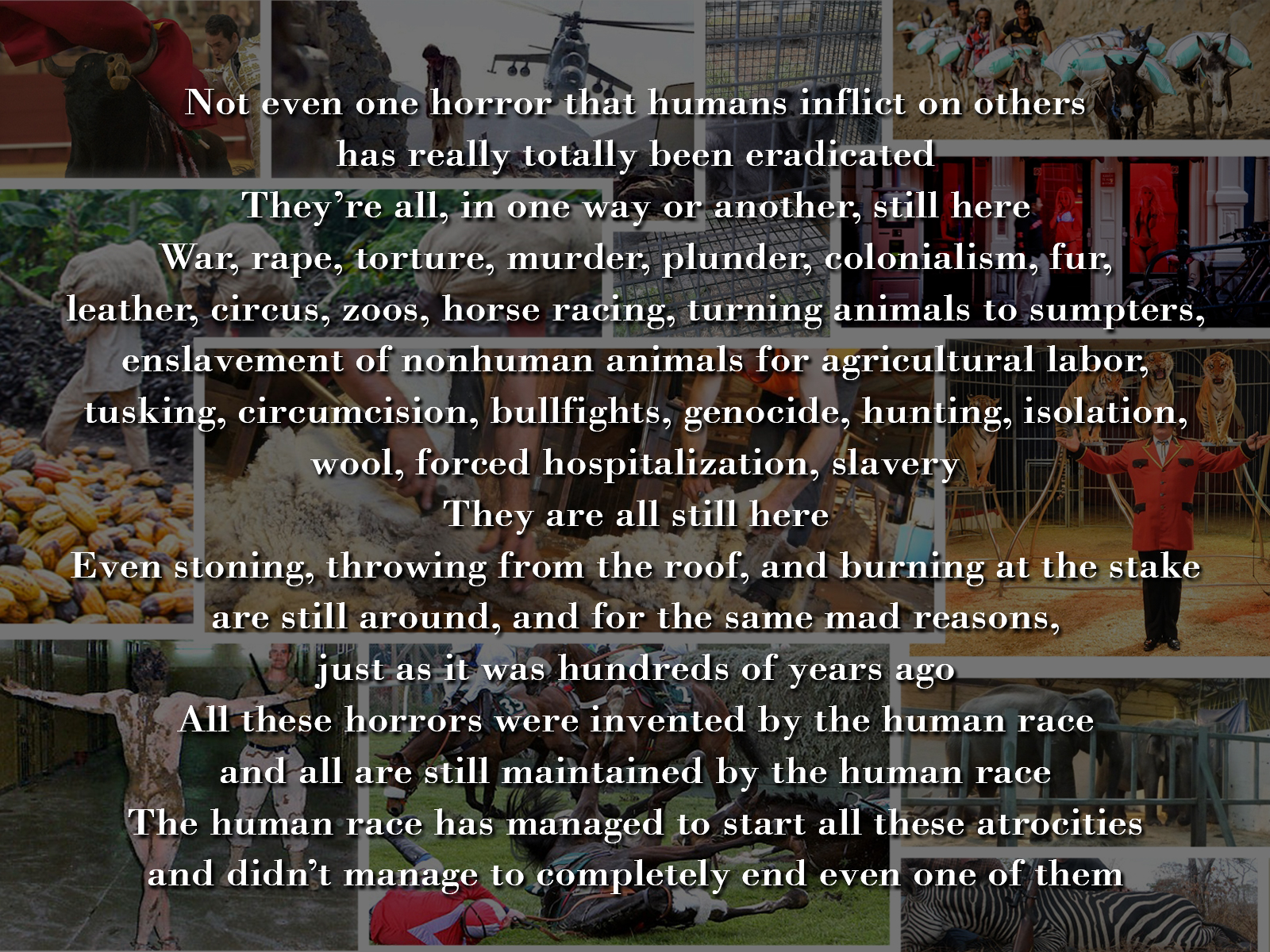
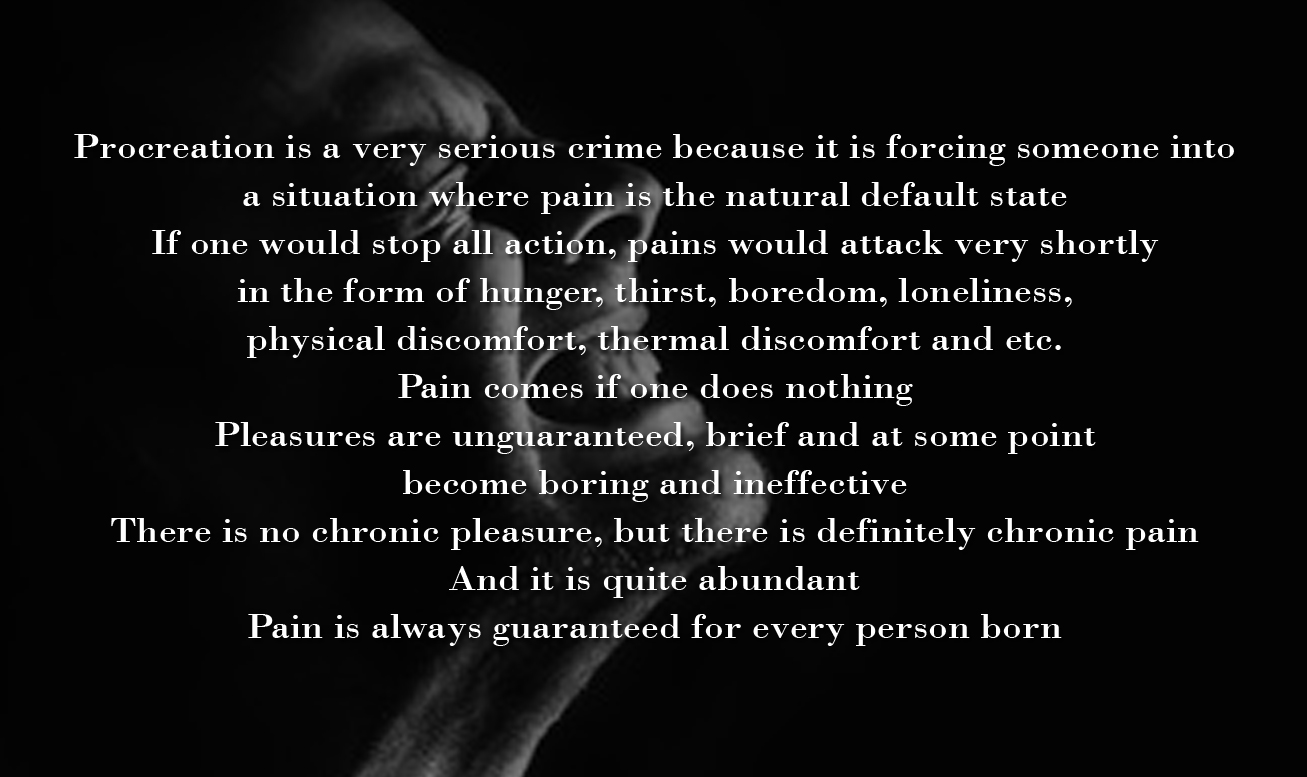


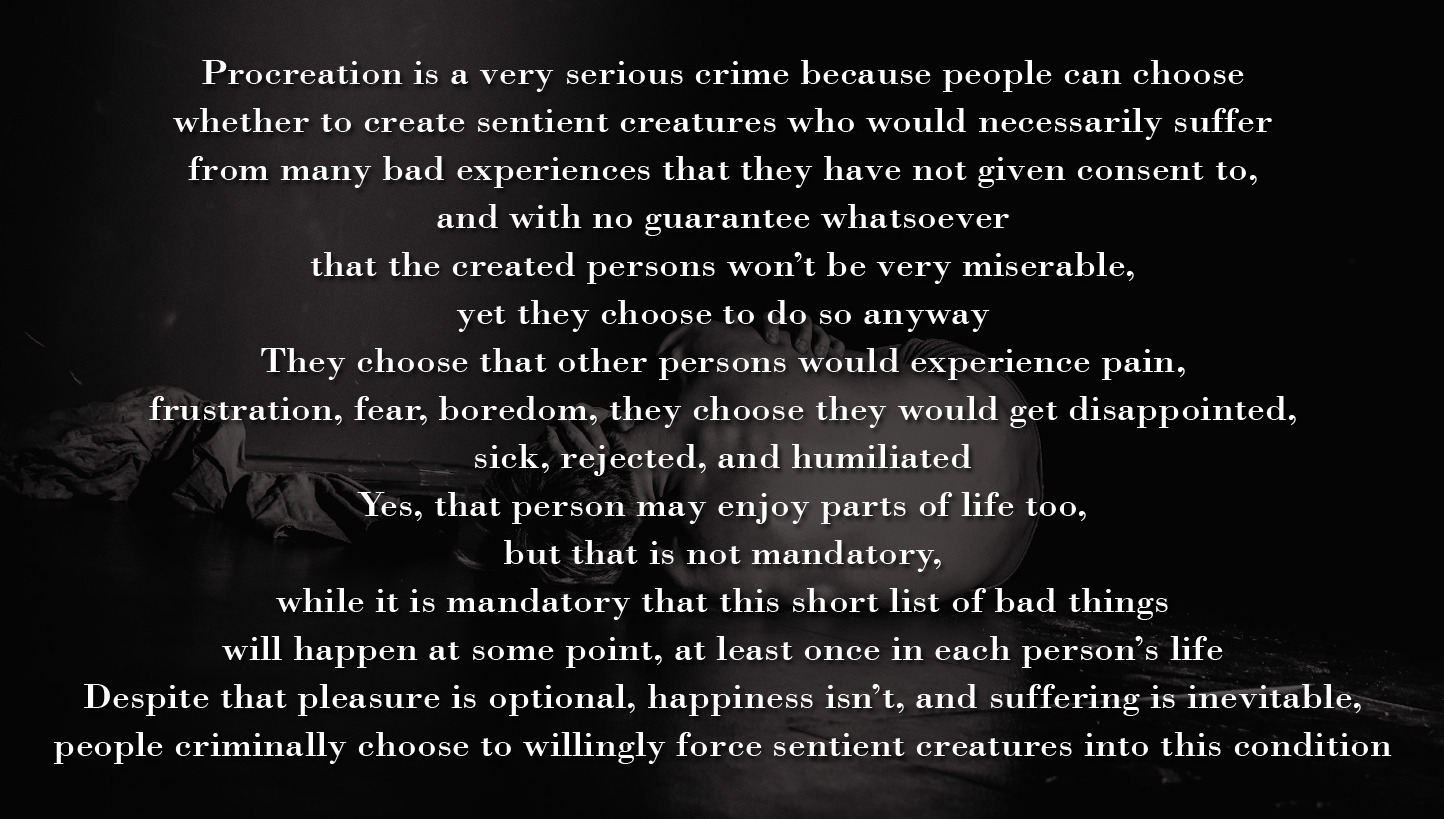
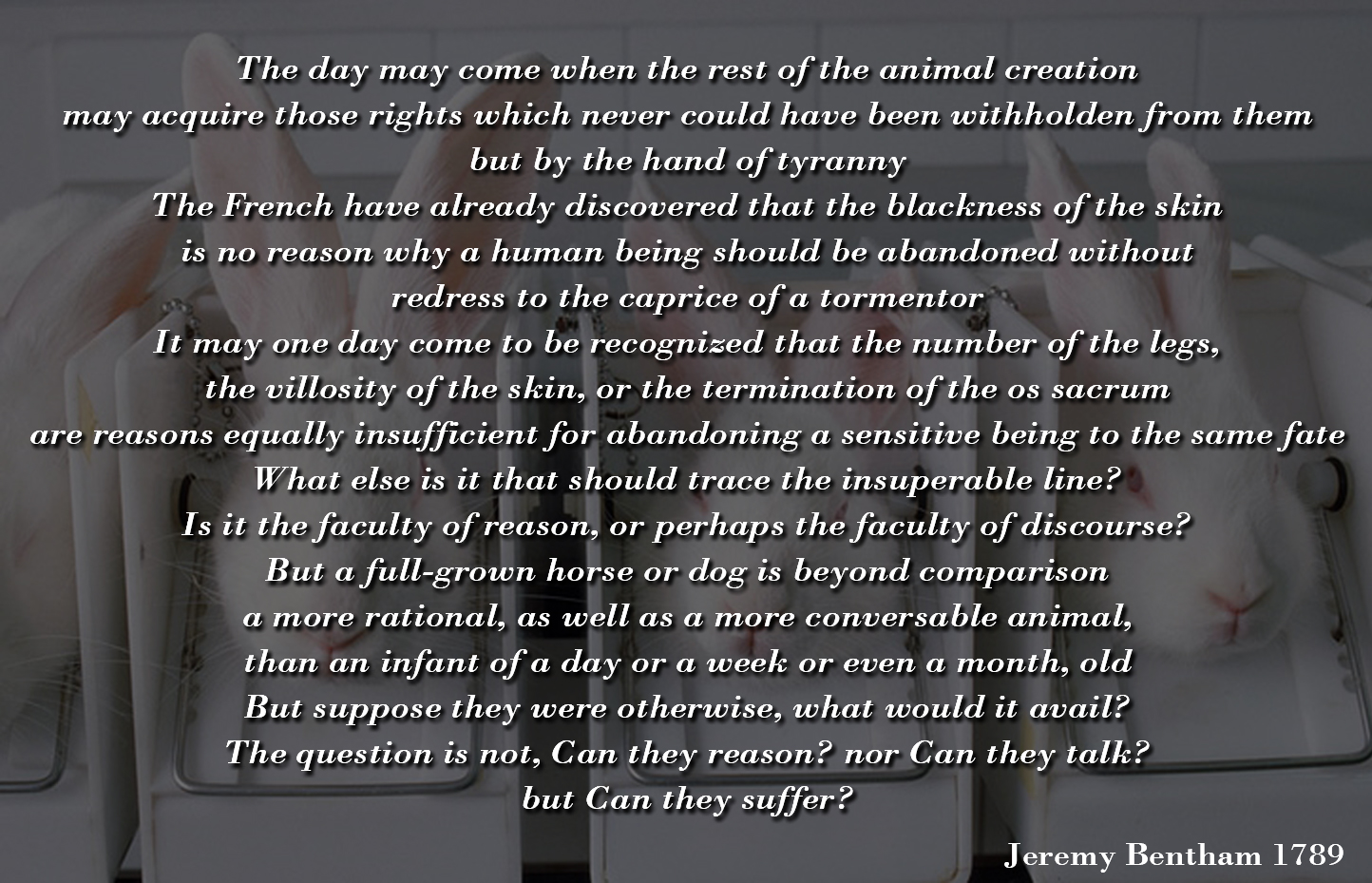
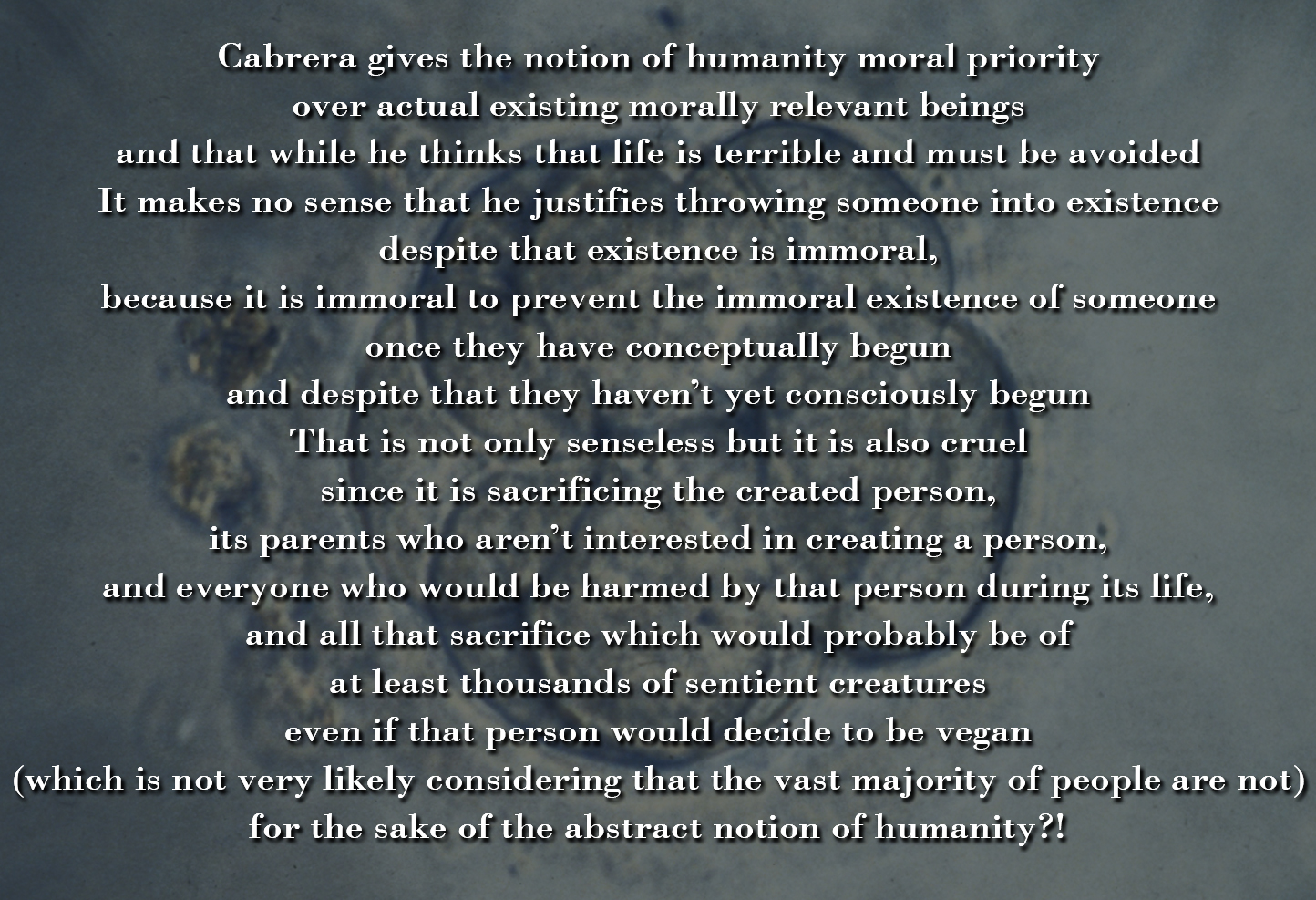
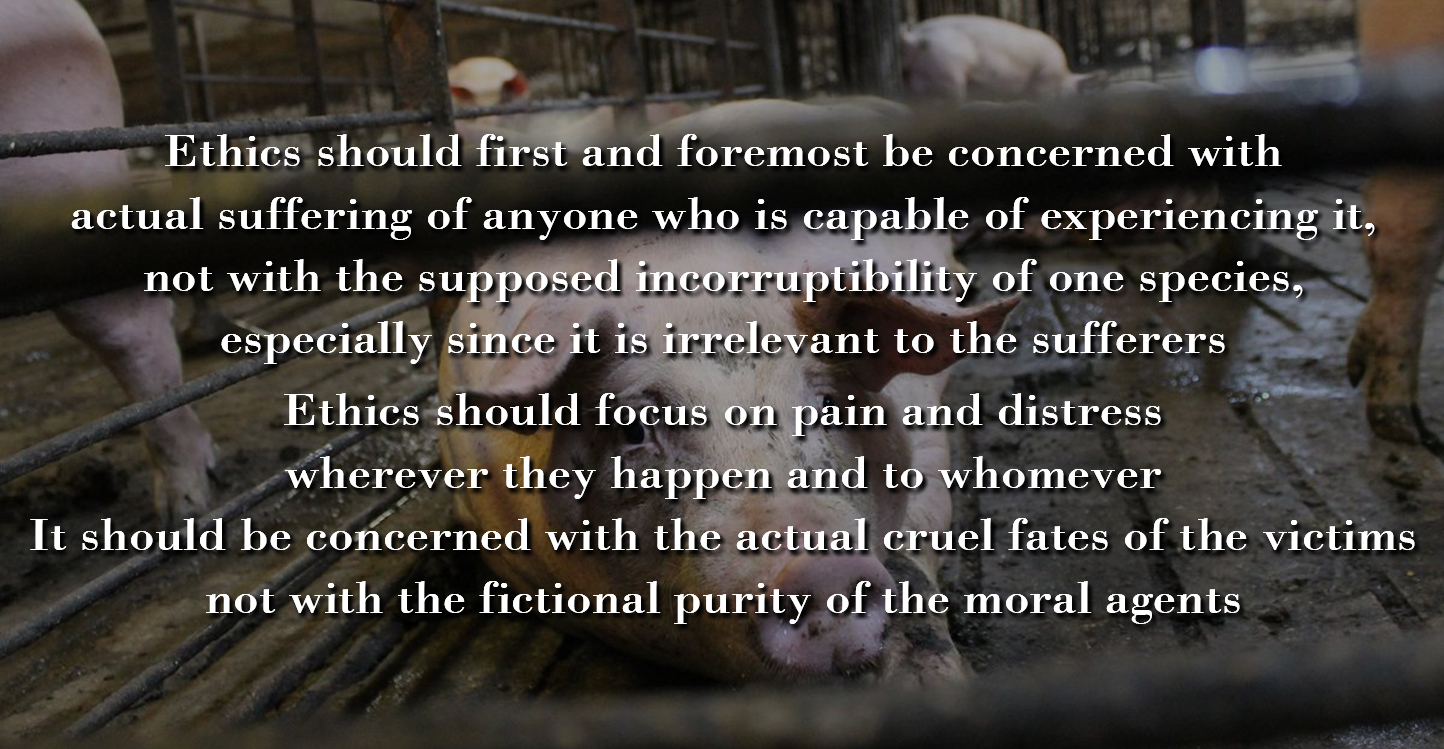
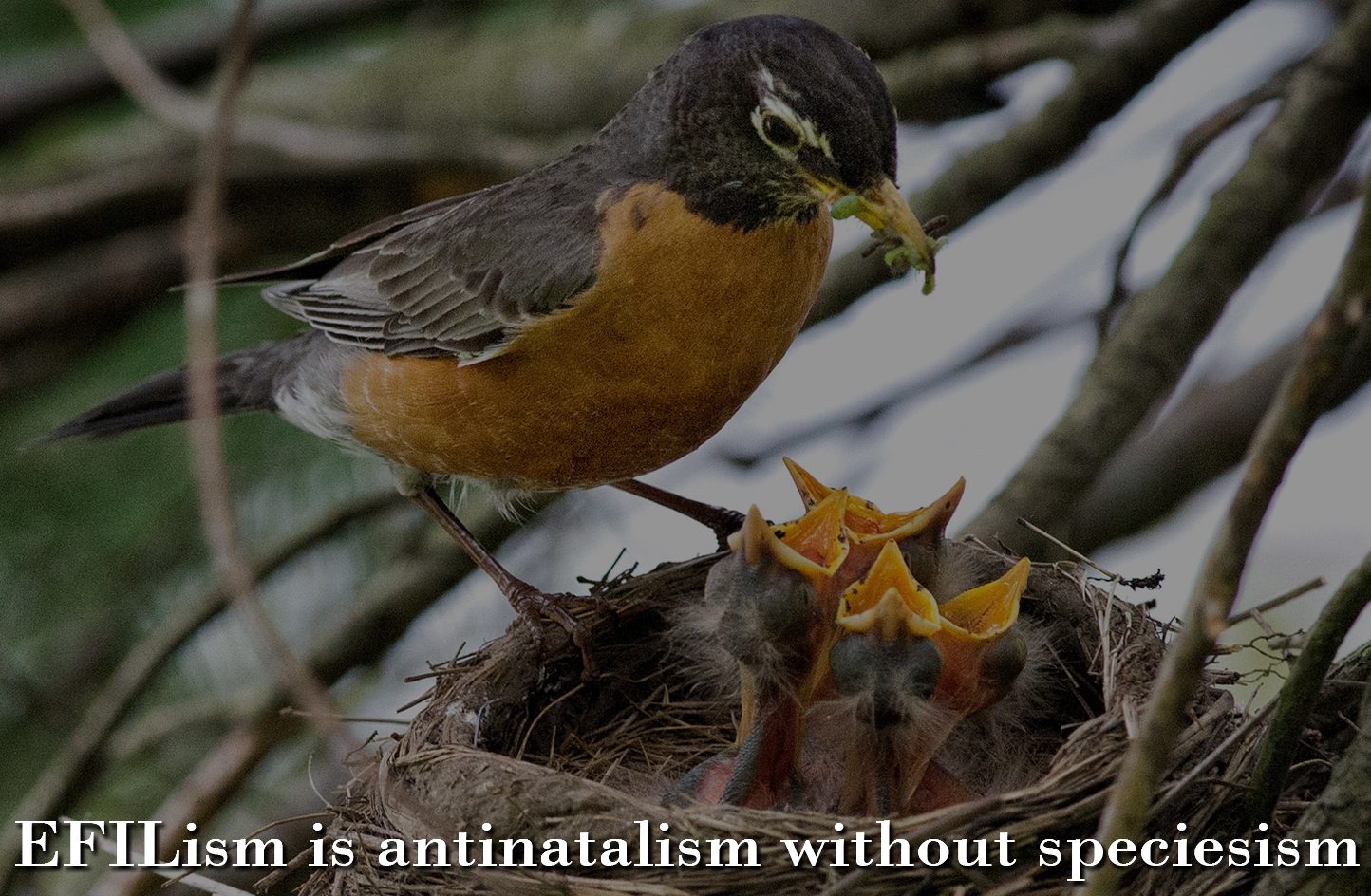
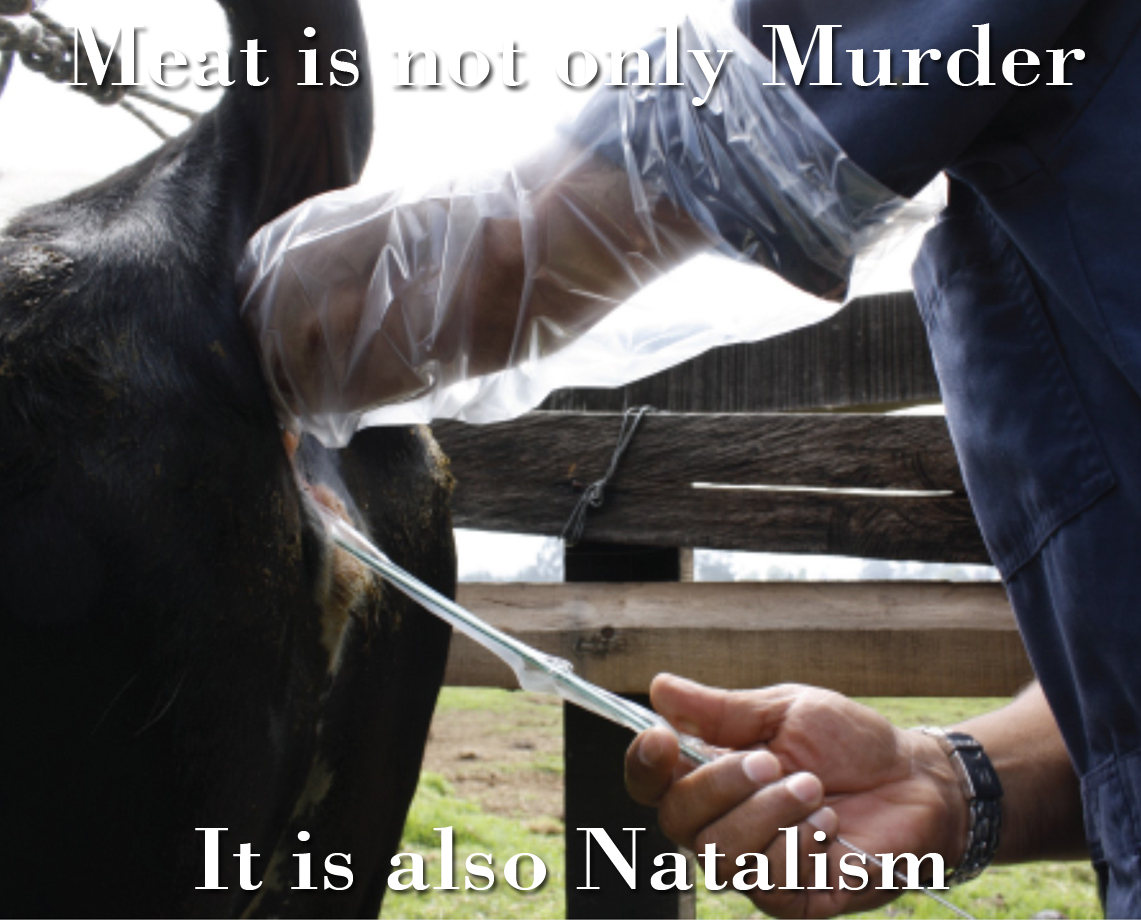
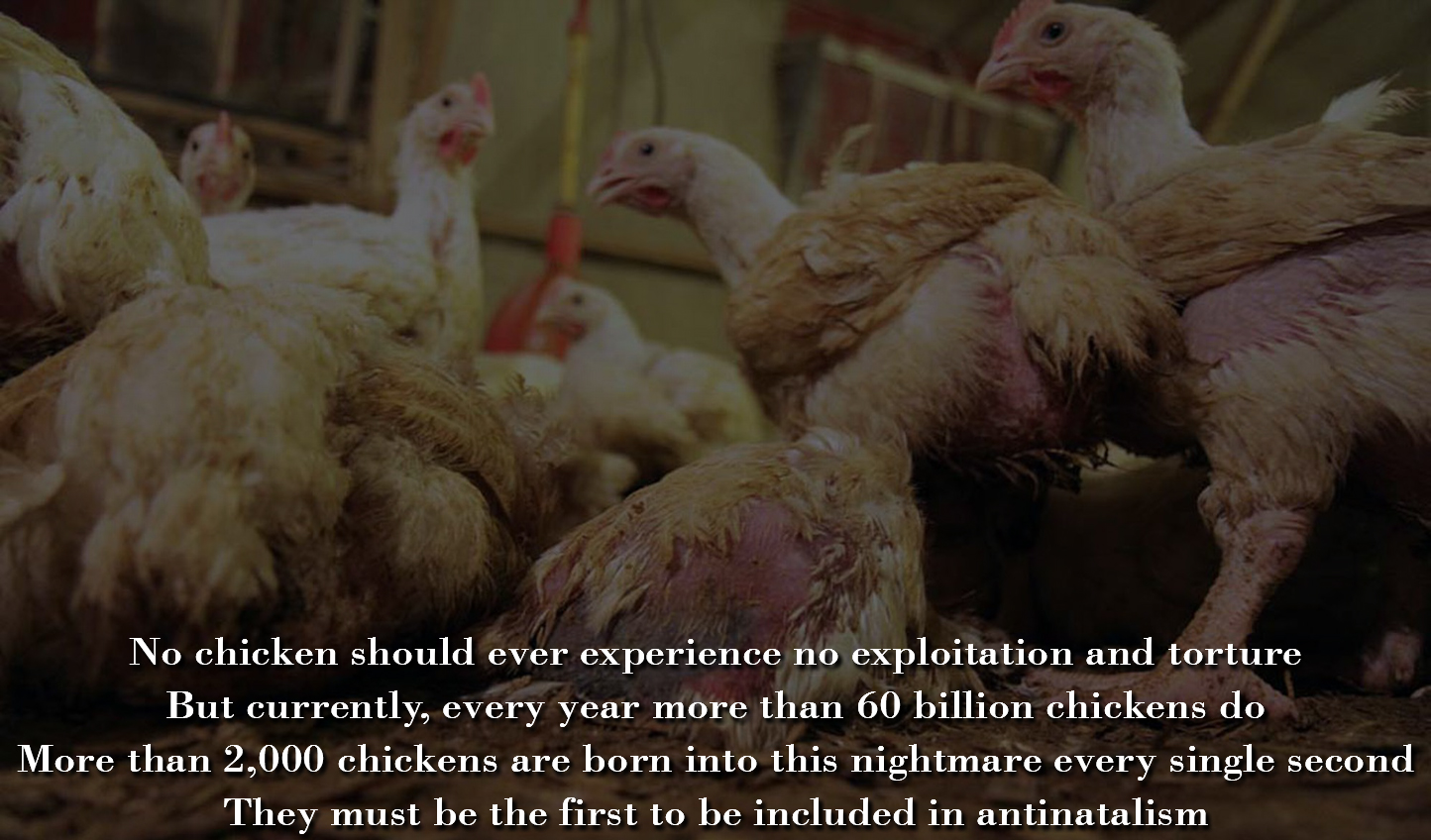
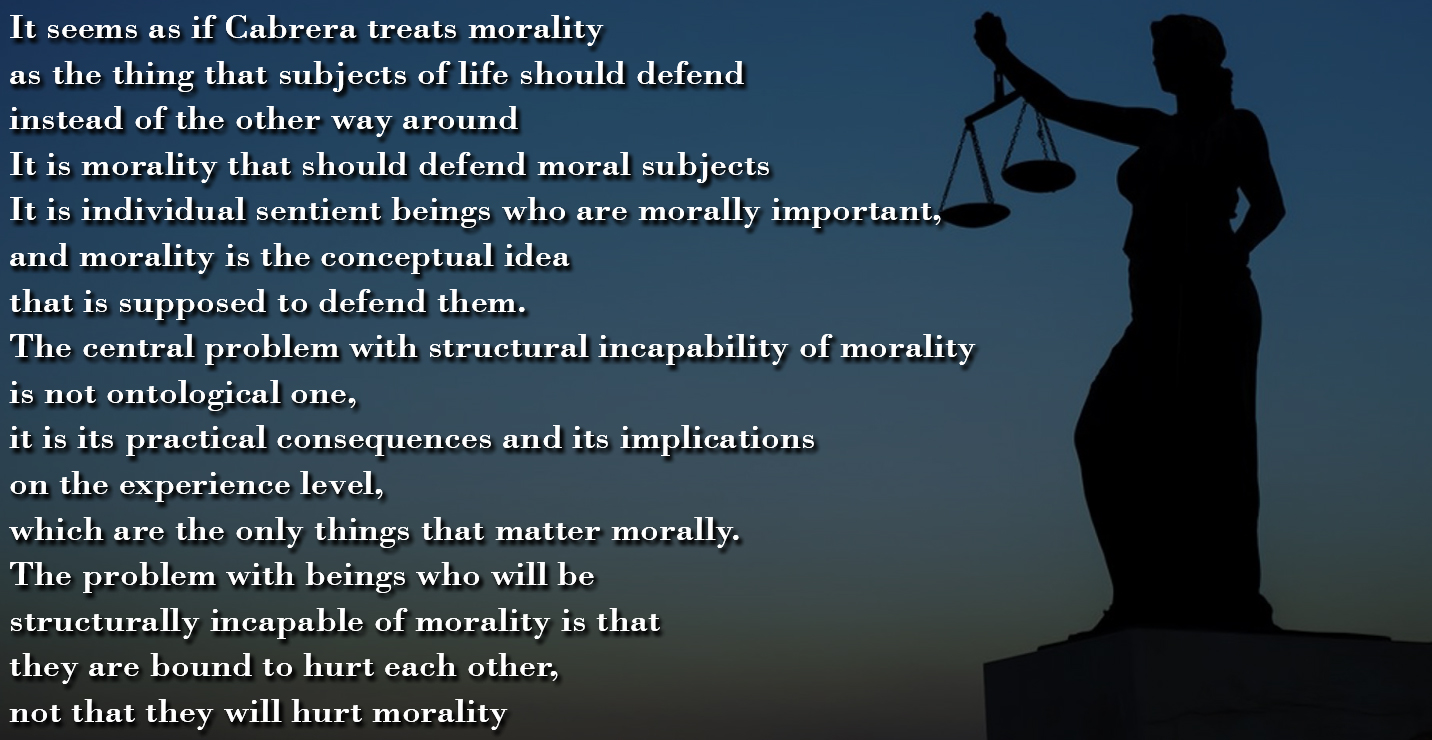
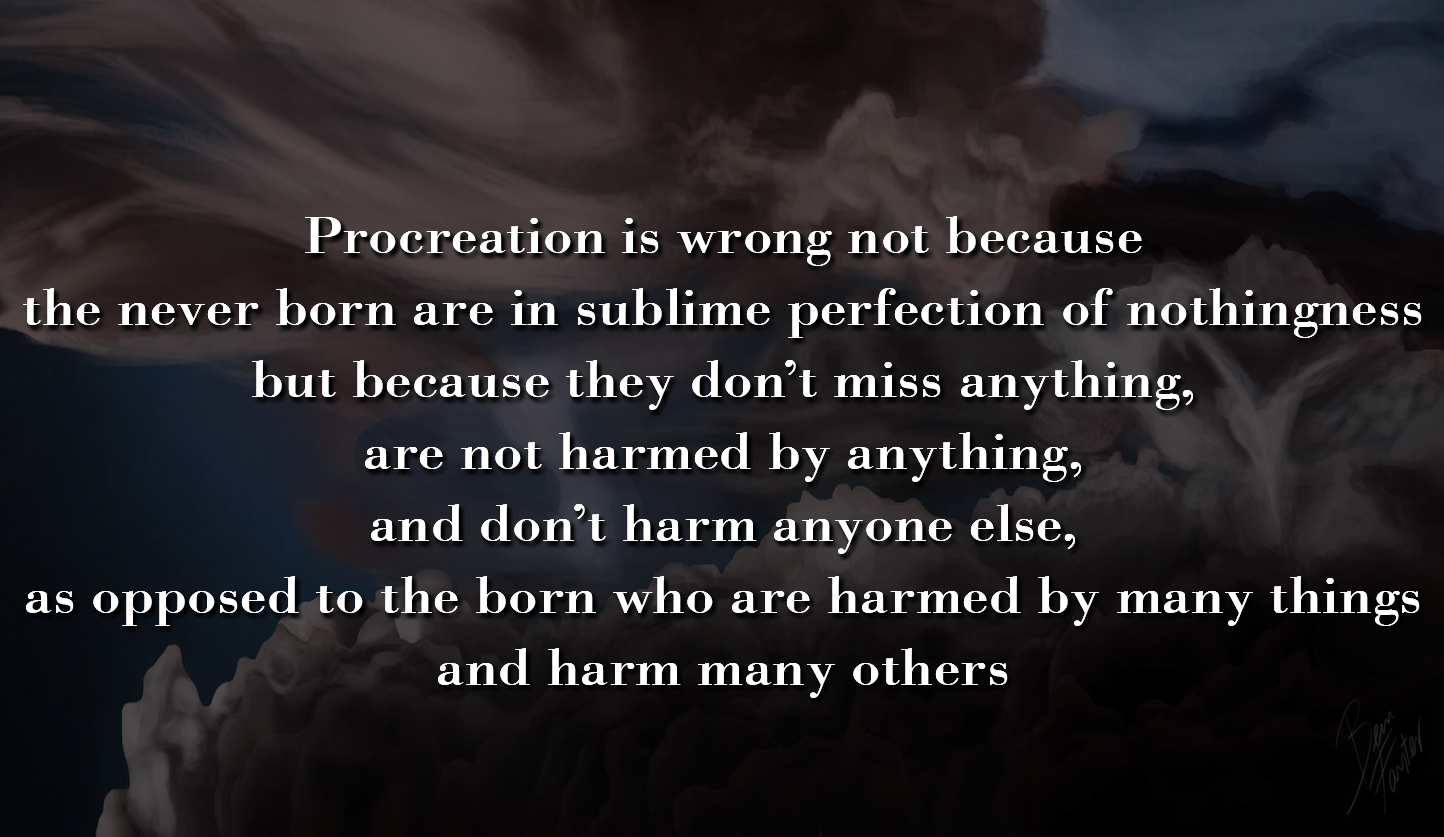
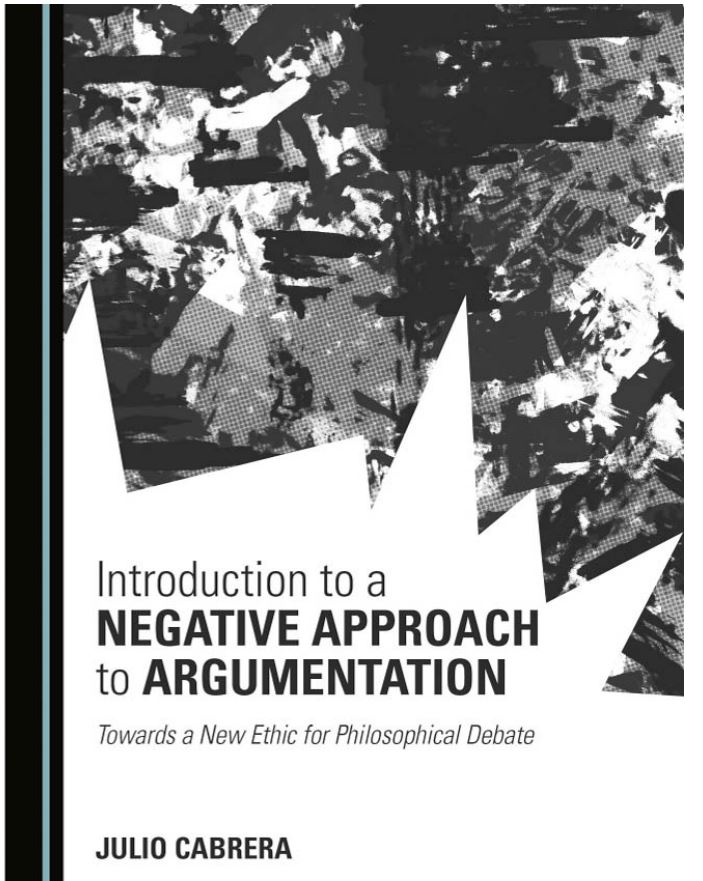

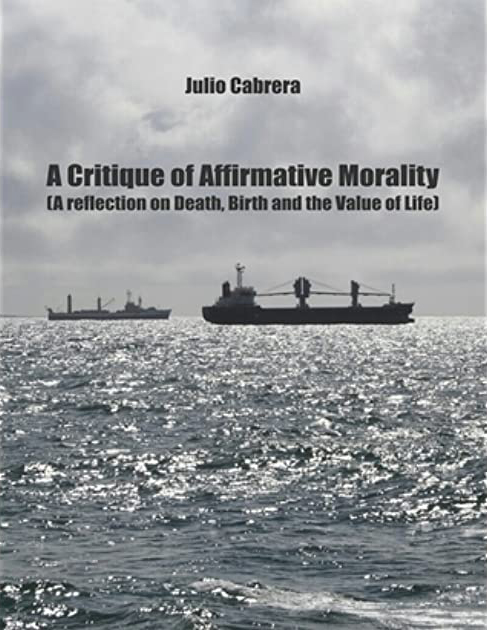
Recent Comments